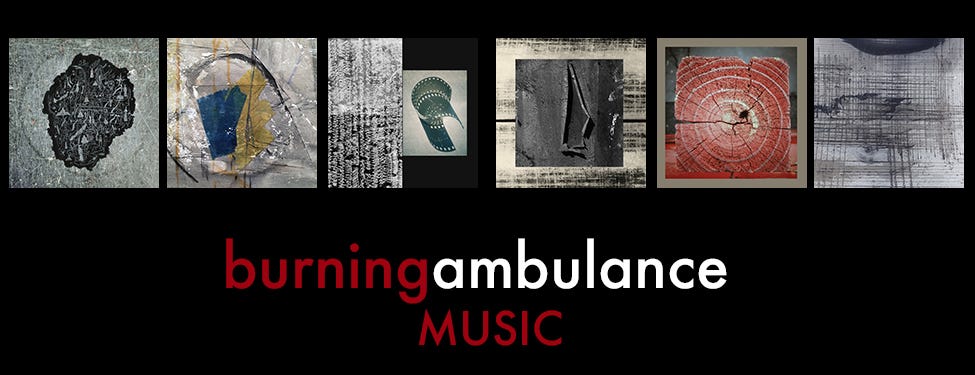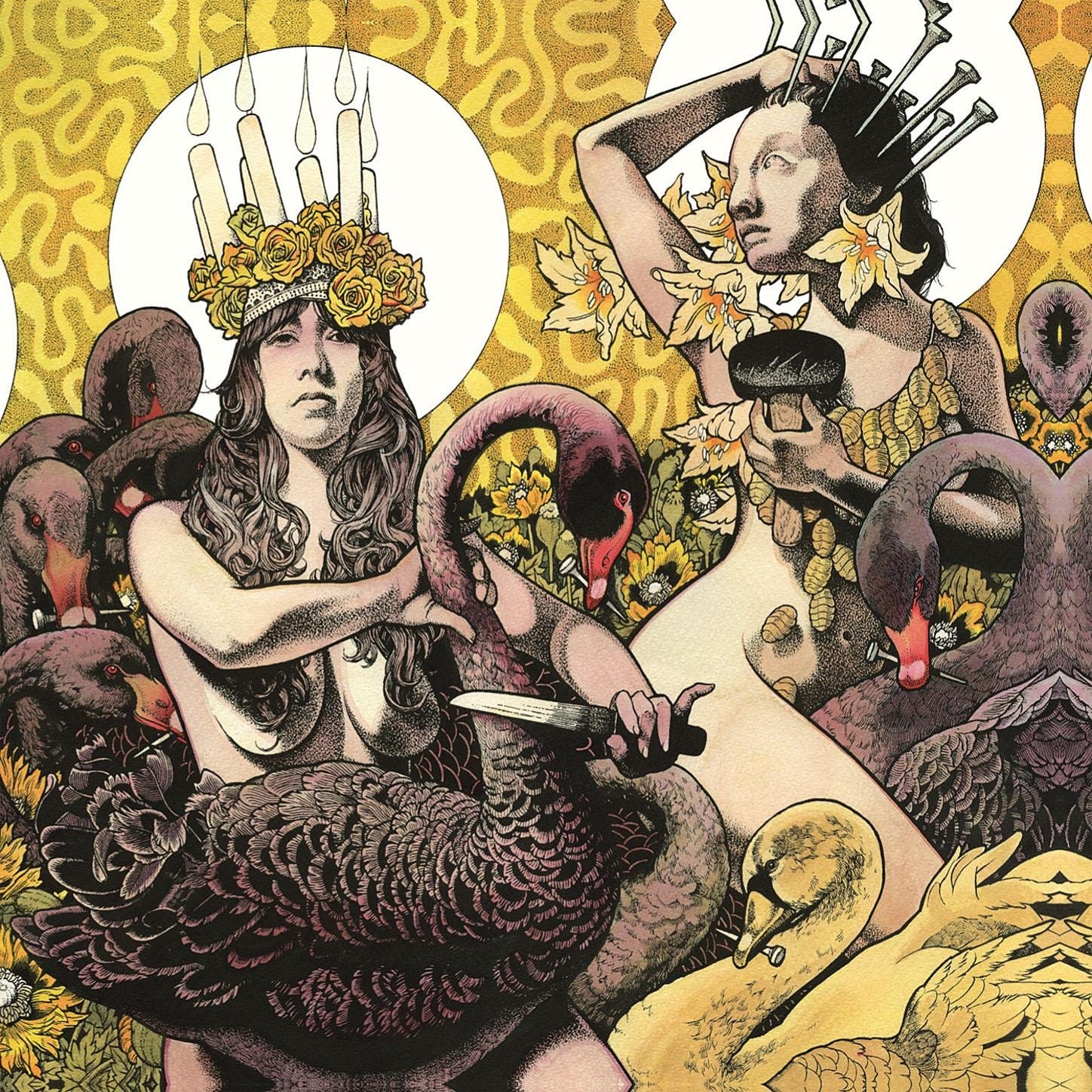New Podcast: Adam Rudolph! Also: Grindcore!
A discussion of fusion, "world music," and syncretism.
The latest Burning Ambulance podcast is out today. It features an interview with percussionist Adam Rudolph. Listen via Osiris, via Apple Podcasts, on Spotify, or anywhere else you get your podcasts. I swear every time I self-Google, there’s some new platform out there hosting this show.
Anyway…Adam Rudolph should be much better known than he is. He’s been around since the early ’70s and has worked with everyone: Yusef Lateef, Fred Anderson, Don Cherry, Roscoe Mitchell, Pharoah Sanders, Sam Rivers, Wadada Leo Smith, Herbie Hancock, Maulawi, Foday Musa Suso, Hassan Hakmoun, Jon Hassell… he’s part of the Bill Laswell company of players, too, so he’s on a zillion records through that connection. Plus he leads two main groups of his own, Moving Pictures and the Go! Organic Orchestra. Side note: Graham Haynes is a member of Moving Pictures, and if you haven’t heard Echolocation, Graham’s record with Submerged on Burning Ambulance Music, I highly recommend checking it out.
We had a really fascinating conversation over the course of two phone calls. The impetus was Symphonic Tone Poem For Brother Yusef, a collaboration between Rudolph and reeds player Bennie Maupin, who’s a legend on his own — he played on Miles Davis’s Bitches Brew and On The Corner, he was a member of Marion Brown’s group in the 1960s, he was in Mwandishi and the Headhunters with Herbie Hancock, he played with Woody Shaw, and his own album from 1974, The Jewel In The Lotus, is an absolutely brilliant record that blends spiritual jazz with almost New Age ambient music. There’s really no other record like it; if you’ve never heard it, it’s a must-hear. So obviously Rudolph and I talk about Maupin, whom he’s worked with off and on for decades, but we also talk about Laswell and about Lateef and about the whole idea of world music and fusion-as-creative-mindset that I’ve been discussing with every artist I’ve interviewed for the podcast this year. I think you’ll come away from this episode with a lot to think about — I know I did — and I hope you enjoy listening to it.
Grindcore: there’s really nothing like it. I still remember what it felt like the first time I heard the first two Napalm Death albums (combined together, with four bonus tracks added, on this ridiculous 1988 CD). It was like sticking my head into a spinning wind tunnel. It was so fast, so overpowering, I almost had to laugh at the insanity of it. It made hardcore punk and Slayer sound like classic rock. Now, I don’t like all grind. Some of the highly favored bands of yore, like Nasum, leave me cold; their music was too slick and polished. I’ve always favored more floor-punching, grimy grind, like Resistant Culture (a D-beat-ish Native American crew), Kill The Client, and the aptly named Rotten Sound. And of course, each of vocalist Jon Chang’s bands (Discordance Axis, GridLink, and the weirdly slept-on No One Knows What The Dead Think) were amazing.
Anyway, two of my favorite grind bands have just put out new albums that are incredible, and well worth your time (which they will not take much of — you can listen to both these albums in full in 61 minutes).
Wormrot’s Hiss is their fourth full-length, and might be their last; vocalist Arif Suhaimi has announced his departure from the group, and his wife was their manager, so we’ll see, but it doesn’t look good. Anyway, Hiss is a hell of a note to go out on. It packs 21 songs into 33 minutes, with guitarist Rasyid Juraimi delivering a stunning array of styles, from shards-of-noise to almost Billy Zoom-esque rockabilly riffs to crunching metal as drummer Vijesh Ghariwala makes with the blast beats, the hardcore moshpit beats, and everything else you need to make small, sweaty rooms explode. Vocally, Arif is all over the place, from a Roger Miret-ish bark to a Jon Chang-like shriek. And there’s one more amazing element to this record: the eerie, haunting violin that shows up on three or four tracks, adding a whole lot of emotional depth to what’s otherwise some of the most merciless grind you’ll ever hear.
Meanwhile, Poland’s Antigama have just released their eighth album (their first in seven years), Whiteout. They’ve always been arty and weird, not for everyone, but something about their herky-jerky, occasionally dissonant take on grind really hits the spot for me. This album has the relentless drum assault I love (courtesy of Pavel Jaroszewicz, whose Encyclopaedia Metallum page lists over 30 bands, and it’s easy to hear why; the dude is a machine), and guitarist Sebastian Rokicki is a wizard, too, throwing in industrial-tinged and Meshuggah-esque touches alongside the blazing grind riffage. Bassist Sebastian Kucharski doesn’t really get much space to show off, but he glues things together nicely, and vocalist Lukasz Myszkowski is a human blast furnace in the vein of Brutal Truth’s Kevin Sharp. Eleven tracks in 28 minutes, every one a keeper, and the distorted sax wailing on “2222” is a most welcome surprise.
Todd Manning reviewed Om Improvement, the latest album by experimental rock band Rusk, for the main site. Says he:
Om Improvement gives the word ‘experimental’ its meaning back. Not that this is the most radical music ever produced, but each song sounds like a theory being tested, each operating according to its own logic... Rusk is unmistakably informed by the indie rock bands of the Nineties like Mogwai, Tortoise, Low, and Dirty Three. It’s certainly no coincidence that Tortoise’s John McIntyre recorded and mixed the album. But the Gaines brothers only use these influences as a jumping-off point, and are quick to establish a persona all their own. Each song could serve as the DNA for a whole album on its own and Om Improvement sounds like a greatest hits album culled from a discography that doesn’t exist yet.
I wrote about Baroness’s amazing double CD, Yellow & Green, for Stereogum, on the occasion of its 10th anniversary. Of course, it’s also the 10th anniversary of the horrifying tour-bus accident that almost killed them. So I talked about that, too.
As the summer of 2012 began, the Savannah, Georgia art-metal quartet Baroness were on the verge of an artistic and commercial breakthrough. Less than two months later, there were very serious questions about whether they would continue to exist at all. Yellow & Green, Baroness’ third full-length…should have been a triumphant fanfare as they arrived at the top of the mountain to stand alongside Mastodon as the future of Southern heavy rock. Instead, it almost destroyed them…Yellow & Green was, and is, a musical triumph. It should have sold better than its predecessors, allowed Baroness to tour successfully, and generally raised them to the next level as a great 21st century American rock band. A major label might have plucked them away from Relapse, as Warner/Reprise had done with Mastodon. But less than a month after the album’s release, on August 15, Baroness’ tour bus lost its brakes and slid off a viaduct while traveling downhill near Bath, England, falling 30 feet. John Baizley’s left arm and left leg were broken; Allen Blickle and touring bassist Matt Maggioni suffered fractured vertebrae. Peter Adams was only slightly injured, and was out of the hospital the next day.
That’s it for now. See you in a week!






